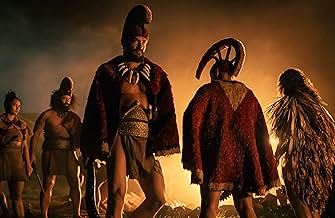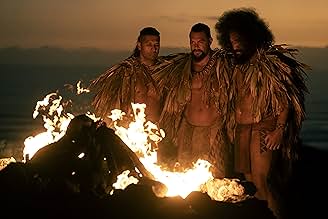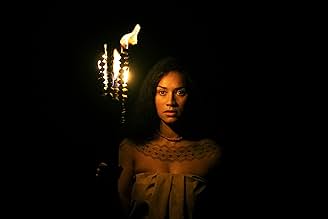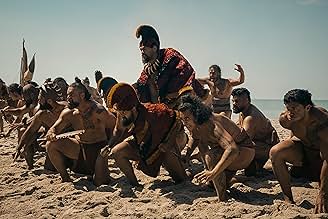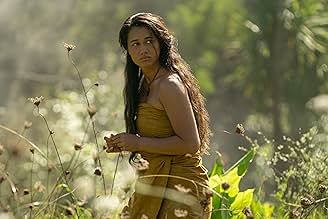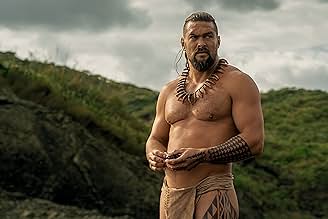Uma história emocionante e sem precedentes sobre a unificação das ilhas havaianas a partir de uma perspectiva indígena. Um chefe de guerra havaiano participa de uma campanha sangrenta para u... Ler tudoUma história emocionante e sem precedentes sobre a unificação das ilhas havaianas a partir de uma perspectiva indígena. Um chefe de guerra havaiano participa de uma campanha sangrenta para unir as ilhas em guerra.Uma história emocionante e sem precedentes sobre a unificação das ilhas havaianas a partir de uma perspectiva indígena. Um chefe de guerra havaiano participa de uma campanha sangrenta para unir as ilhas em guerra.
Explorar episódios
Avaliações em destaque
...., Hawaiian language and too much dialogue, low functioning humans. I'm 2 episodes in and Momoa is surprisingly good and the other actors are unsurprisingly phenomenal. The flow of the story has been engaging and leaves you wanting to see more and all of this before any fighting scenes. The soundtrack is beautiful, the cinematography is beautiful and whether it's 100% historically correct is irrelevant. Enjoy!
Wow seriously ignore the dumb negative reviews clearly most of those are folks who did not even watch any of the episodes so far. Check out this new epic story - I'm hooked!
Chief of War is more than just a historical drama-it's a cinematic homage to a culture rarely given this much screen time, and it doesn't waste a single frame in telling its story with reverence, grit, and heart.
Scenery and Cinematography: A Visual Masterpiece
From the opening shots, the Hawaiian islands (and yes I know where it was filmed so what it's beautiful and works setting the right tone) are treated not merely as a backdrop but as a living character. The lush greens, volcanic reds, and expansive blues of the Pacific are captured in breathtaking wide-angle shots and sweeping aerial views. The cinematography is meticulous, almost meditative at times, with deliberate pacing that draws you into the natural rhythm of island life-and the turbulent undercurrents of war.
Whether it's mist-covered cliffs, churning surf, or smoke rising from tribal fires, every scene feels handcrafted. Natural light is used to stunning effect, particularly in golden-hour battles and quiet conversations under torchlight. It's immersive and evocative-clearly influenced by Terrence Malick and The Last of the Mohicans-but with a distinctly Polynesian heartbeat.
Music and Sound Design: A Spiritual Undercurrent - Zimmer sets the mood
The score blends traditional Polynesian instruments with modern cinematic cues to elevate tension and emotion without overpowering the moment. The use of indigenous chants, percussion, and melodic motifs grounds the story in authenticity and identity. Music here doesn't just accompany the narrative-it anchors it. In quieter scenes, the ambient sound of the ocean or jungle builds a visceral sense of place that never lets you forget where you are: this is Hawaii, before the West came calling.
Characterization: Layered, Human, and Authentic
Jason Momoa leads with raw intensity, but it's his restraint in key moments that makes his performance resonate. He embodies a man torn between tradition and transformation-between chief and warrior, between vengeance and vision. The supporting cast is equally strong, particularly the women, who are not sidelined but integral to the emotional and political stakes of the story.
The show avoids turning characters into mere archetypes. Even the antagonists are layered, with motivations rooted in power, fear, or survival, rather than cartoonish villainy. Tribal alliances, family dynamics, and individual ambition collide with believable complexity.
Storytelling: Epic in Scope, Intimate in Heart
At its core, Chief of War tells a story about identity-cultural, personal, and generational. It balances sweeping historical events with intimate personal struggles. The pacing leans slow-burn in the best way, giving characters and conflicts time to breathe.
The writing doesn't spoon-feed exposition, trusting the audience to stay engaged and follow along as customs, rituals, and politics unfold naturally. This lends the show a sense of realism and weight, making the betrayals more heartbreaking and the triumphs more earned.
Themes of legacy, honor, resistance, and sacrifice are woven throughout without becoming didactic. And while the show doesn't shy away from brutality, it also leaves room for beauty, love, and quiet reflection.
Final Verdict:
Chief of War is a powerful, respectful, and beautifully crafted series that elevates indigenous storytelling to a new cinematic high. It's a rare show that educates while it entertains, moves you while it mesmerizes. With its gripping narrative, stunning visuals, rich characters, and soulful score, it's a must-watch for fans of historical epics and cultural storytelling done right.
Chief of War is more than just a historical drama-it's a cinematic homage to a culture rarely given this much screen time, and it doesn't waste a single frame in telling its story with reverence, grit, and heart.
Scenery and Cinematography: A Visual Masterpiece
From the opening shots, the Hawaiian islands (and yes I know where it was filmed so what it's beautiful and works setting the right tone) are treated not merely as a backdrop but as a living character. The lush greens, volcanic reds, and expansive blues of the Pacific are captured in breathtaking wide-angle shots and sweeping aerial views. The cinematography is meticulous, almost meditative at times, with deliberate pacing that draws you into the natural rhythm of island life-and the turbulent undercurrents of war.
Whether it's mist-covered cliffs, churning surf, or smoke rising from tribal fires, every scene feels handcrafted. Natural light is used to stunning effect, particularly in golden-hour battles and quiet conversations under torchlight. It's immersive and evocative-clearly influenced by Terrence Malick and The Last of the Mohicans-but with a distinctly Polynesian heartbeat.
Music and Sound Design: A Spiritual Undercurrent - Zimmer sets the mood
The score blends traditional Polynesian instruments with modern cinematic cues to elevate tension and emotion without overpowering the moment. The use of indigenous chants, percussion, and melodic motifs grounds the story in authenticity and identity. Music here doesn't just accompany the narrative-it anchors it. In quieter scenes, the ambient sound of the ocean or jungle builds a visceral sense of place that never lets you forget where you are: this is Hawaii, before the West came calling.
Characterization: Layered, Human, and Authentic
Jason Momoa leads with raw intensity, but it's his restraint in key moments that makes his performance resonate. He embodies a man torn between tradition and transformation-between chief and warrior, between vengeance and vision. The supporting cast is equally strong, particularly the women, who are not sidelined but integral to the emotional and political stakes of the story.
The show avoids turning characters into mere archetypes. Even the antagonists are layered, with motivations rooted in power, fear, or survival, rather than cartoonish villainy. Tribal alliances, family dynamics, and individual ambition collide with believable complexity.
Storytelling: Epic in Scope, Intimate in Heart
At its core, Chief of War tells a story about identity-cultural, personal, and generational. It balances sweeping historical events with intimate personal struggles. The pacing leans slow-burn in the best way, giving characters and conflicts time to breathe.
The writing doesn't spoon-feed exposition, trusting the audience to stay engaged and follow along as customs, rituals, and politics unfold naturally. This lends the show a sense of realism and weight, making the betrayals more heartbreaking and the triumphs more earned.
Themes of legacy, honor, resistance, and sacrifice are woven throughout without becoming didactic. And while the show doesn't shy away from brutality, it also leaves room for beauty, love, and quiet reflection.
Final Verdict:
Chief of War is a powerful, respectful, and beautifully crafted series that elevates indigenous storytelling to a new cinematic high. It's a rare show that educates while it entertains, moves you while it mesmerizes. With its gripping narrative, stunning visuals, rich characters, and soulful score, it's a must-watch for fans of historical epics and cultural storytelling done right.
Reminds me of the authentic look and feel of the film Apocalypto. Momoa and Morrison are strong anchors with a undeniable on camera presence. Nothing looks or feel fake or weak. Every department that created the series did an amazing job. The language is fascinating and delivered so well by the actors. It's an entertaining thrill and a dynamic history course all in one.
Jason Momoa is back with a new series called Chief of War and it's some of the best work he's done in his entire career. It's about four kingdoms in Hawaii that are divided by a war. To prevent more killing and bloodshed, a Hawaiian war chief (Momoa) goes on a mission to unite his people against a new threat that's coming to their land. What follows is an incredible true story and one of the best new shows of the year. It currently has a 94% on Rotten Tomatoes so the reviews have been great. Chief of War reminds me of the Hawaiian version of Shogun. Momoa is the standout here but the entire cast is incredible. I can see this show not only being nominated for a ton of awards but winning them too.
I am deaf and I was born and raised in Hawai'i, but with no Hawaiian ancestry. I still have my highest respect in Hawaiian values and culture. When I heard about this TV series by Jason Momoa, I was thrilled to watch. But once I started watching, I was looking around to turn on the subtitles because I am deaf. To my astonishment, I discovered the Hawaiian subtitles!! Luckily, I took the elementary Hawaiian classes at Kapi'olani CC, and to satisfy my curiosity, I turned on the subtitles in Hawaiian and... it gave me goosebumps!! By seeing the subtitles in true Hawaiian language, I was able to read and understood some of them. Incredible!!! I'm excited to be able to watch this with subtitle options being shown in English and Hawaiian. Mahalo, Jason Momoa and the entire crew behind this TV series and Apple TV for this amazing feat!
Você sabia?
- CuriosidadesJason Momoa did not speak fluent Hawaiian before filming Chief of War. To prepare, he underwent intensive language training with a coach who even lived with him. Momoa called it "the hardest thing I've ever done," admitting it was tougher than learning Dothraki for Game of Thrones. Only about 20% of the cast was fluent at the start, so most, including Momoa, learned from scratch to ensure the series' cultural and linguistic authenticity.
- ConexõesReferenced in The Nite-Cap: Has The Superhero Hype Come To An End? (2025)
Principais escolhas
Faça login para avaliar e ver a lista de recomendações personalizadas
- How many seasons does Chief of War have?Fornecido pela Alexa
Detalhes
- Tempo de duração
- 50 min
- Cor
- Mixagem de som
- Proporção
- 2.39:1
Contribua para esta página
Sugerir uma alteração ou adicionar conteúdo ausente







